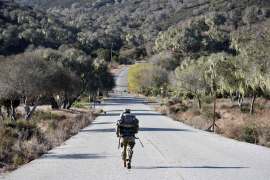Opinions: U.S. HIV Funding; Global Fund Accountability; World Food Supply
Increase U.S. Funding For Global HIV/AIDS
President Barack Obama's Global Health Initiative is "pitting AIDS against other diseases by making investments in new areas of global health contingent on flat funding for efforts to fight the HIV epidemic," HIV/AIDS advocate and Yale College student Gregg Gonsalves writes in a Washington Post opinion piece. "What the president is doing has deadly consequences leaving funding for AIDS programs flat will lead to more deaths and new infections around the world, just as progress is being made in many countries."
Gonsalves writes that "the president has received pleas from Nobel laureate Archbishop Desmond Tutu, Doctors Without Borders, more than 30 deans of schools of medicine and public health, and other global health experts. The core of their common message: We can build on the successes against AIDS to boost efforts on maternal and child health, neglected diseases and strengthening health systems; there is no need to pit worthy priorities against each other, particularly when a comprehensive approach would cost far less than the bank bailouts and, yes, the estate tax repeal that the president signed into law last month."
Addressing concerns that HIV treatment is becoming cost prohibitive, Gonsalves writes "that many other analyses support the wisdom of providing these life-saving medicines and that for almost a decade there has been a bipartisan and expert consensus on the need to greatly expand access to AIDS drugs in the developing world." He concludes: "AIDS activists have been global health activists all along, with many calling for health-care reform in the United States since the epidemic first appeared and for strengthening primary care in the developing world for more than a decade. What we don't support is this administration's either/or approach to global health. But we don't know how to get the president to stop fighting us and turn his sights on a foe far more formidable than we are: the AIDS epidemic, still out of control, 30 years after it began in 1981" (1/13).
Time For More Global Fund Accountability
Ahead of a Global Fund to Fight AIDS, Tuberculosis and Malaria meeting next week to address the issue of donor drugs getting stolen and not reaching the intended patients in Africa, American Enterprise Institute Fellow Roger Bate writes in a Foreign Policy magazine opinion piece that the fund's current "accountability standards don't nearly measure up to its hefty budget and vast influence." Bate provides examples of where donor drugs have been stolen and asserts that each "year, perhaps as many as 30 million donated malaria treatments are stolen, similarly diverted from their intended, needy recipients into the hands of profit-driven distributors."
"The Global Fund gets a third of its donations from the United States, but more than U.S. dollars, it needs American oversight," Bate argues. "Currently, the administrative work done by the international health specialists working for the Global Fund Secretariat is overseen a 20-member board, in which the United States has only one seat. The Global Fund board's consensus-based decision-making is politically expedient, but it lacks the executive, investigative power to ensure real accountability. The Global Fund simply doesn't have the resources to both administer and audit medicinal grants," he writes.
"One model for the Global Fund may be the U.S. medicinal aid system, which controls its own drug purchases for the developing world far more tightly," Bate recommends before explaining how the U.S. system works. "When it encounters a problem with public-sector drug distributors, as it has in Angola, it completely bypasses the troublesome actor in this case the Angolan government and looks for other private distribution networks, including direct handoffs from U.S. contractors to in-country clinics. The global health community doesn't approve of this approach, however, suggesting that it wastes funds that could in principle be used to treat more people. Perhaps, but it's indisputable that the drugs at least get to where they're supposed to go," he writes. "The new U.S. Congress is lead by a Republican Party that has promised to take a hard look at wasteful spending decisions. The Global Fund, and its broken distribution systems, would be a good place for them to test their mettle," he concludes (1/11).
Preventing Another Food Crisis
"Food prices are rising again, but the world need not panic yet. According to the Food and Agriculture Organisation, we are experiencing a 'shock' rather than another crisis of the sort that struck in 2007," a Financial Times editorial states.
"Higher prices are not something to be scared of. Indeed, they are a necessary precondition to make supply catch up with demand. ... But nor should they be any cause for complacency," the newspaper writes. "What is needed is a new green revolution. This means improving yields through more drought and disease resistant crops, and more focus on developing agricultural infrastructure. Various unflashy things can be done to help farmers," according to the editorial, which lists some examples of basic interventions that could help. "To protect the poorest against untoward shocks the world must hold deeper stocks especially in vulnerable regions. But rich countries must continue to replace ongoing food aid with investment in agricultural productivity," the newspaper writes. "G8 nations have been slow to fulfil the pledges on funds to promote food security they gave at L'Aquila in 2009. If the present shock makes them speed up, it will not have been entirely in vain" (1/7).
This is part of the Morning Briefing, a summary of health policy coverage from major news organizations. Sign up for an email subscription.





